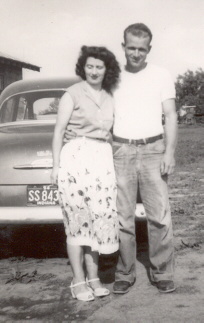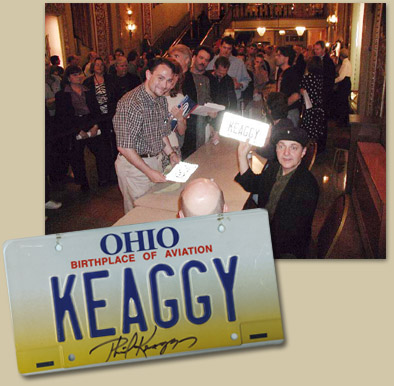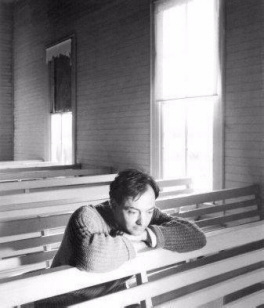The Writer's Craft
Writing
“How lucky Adam was. He knew when he said a good thing, nobody had said it before.”
-Mark Twain
"It is better to fail in originality than to succeed in imitation."
-Herman Melville
"I write for the same reason I breathe - because if I didn't, I would die."
-Isaac Asimov
It’s hard to be completely original. No, it’s impossible. Name any musician, artist, writer, theologian, preacher, politician, educator, comedian, disc jockey, plumber, farmer, butcher, baker, or candlestick maker, and you will discover that each has been inspired by another. We are all influenced by our environment, families, friends, health, faith, etc.
Bono has written that “Every poet is a thief,” and Pablo Picasso once stated that “Good artists copy, great artists steal.” I openly admit my inspiration as a writer, rather than simply and vainly trying to pass every idea off as completely original, as though I’ve lived my life in a vacuum. Even George Lucas’s masterpiece, Star Wars, which takes place a long time ago in a galaxy far, far away was inspired by mythology, world history, a plethora of world religions, the Japanese film Seven Samurai, and the old serials like Buck Rodgers and Flash Gordon.
To use a sewing analogy, unlike many great storytellers who are magnificent weavers, I’m a humble quilter, using scraps from different spheres of influence to create a story. My writing in general is influenced by creative people through the ages, but a nod must be given to J. Michael Straczynski, author and creator/writer of the television series Babylon 5. His writing style, storytelling, and seeing him in person inspired me to go beyond simply having good ideas, and calling myself a writer (though I wasn’t writing anything), to actually sitting down and writing.
Others who have influenced my creative writing are Rod Serling (a strong influence on J. Michael Straczynski), Ray Bradbury, The Beatles, Paul Simon, George Lucas, Steven Spielberg, Ernest Hemingway, Edgar A. Poe, Franz Kafka, Alfred Hitchcock, J.R.R. Tolkien, Sylvester Stallone, Michael Crichton, and Stephen King, just to name a few.
However, those who have inspired me the most are those who have served Jesus Christ through their lives and work. My Grandfather, Edward E. Brock, Jr. is my hero, and is mainly responsible for any redeeming qualities I have in my life. Additionally, he’s an ordained country pastor whose ministry and writing has served as the primary influence of my life.

Blanche & Edward Brock
C.S. Lewis has set the standard for my life. He was a prolific writer and educator, teaching at Oxford. I’m striving to be as prolific and influential as him (might as well aim high, right?), and I’m an educator teaching at Indiana Wesleyan University. Attending the Veritas Forum at The Ohio State University on multiple occasions opened my world to other apologists speakers and writers such as Peter Kreeft, Hugh Ross, Phillip Johnson, and Paul Vitz, who taught me that there is a reasonable basis for our faith, and that we should have a ready defense of our faith as instructed by Peter (1 Peter 3:15).
Christian artists have also captured my imagination, especially musicians. Johann Sebastian Bach set the standard for Western music, and Peter Kreeft has commented that he has met a couple people in his life that came to find God through his music. I’ve been personally influenced by more contemporary Christian artists Phil Keaggy, Rich Mullins, and Kevin Max. I’ve had the privilege of meeting Phil Keaggy a few times, and as the story indicates, had a personalized Ohio KEAGGY license plate. All three are true artists, whose originality and talent is refreshing in Contemporary Christian Music.

Meeting Phil Keaggy and the original KEAGGY plate
Both Rich Mullins and Brennan Manning have been instrumental in my personal faith, and my way of communicating it to others. I felt that I had a pretty healthy amount of “book knowledge” due to the Veritas Forum and seminary, but it was their “ragamuffin” approach to the Gospel of Grace that allowed me to lead with the heart. I’m personally in debt to both of these men, and regret that I haven’t been able to share that with Rich the way I have with Brennan.
I’ve always been a lover of great and inspirational quotes. I’ve selected seven categories from a sample of quotes I’ve collected over the years that have either served as a guide to my own writing, or have simply inspired me to write. I hope that there is a gem in here that inspires you in your craft.
Social Conscience
"I believe in taking a positive attitude toward the world, toward people, toward my work. I think I'm here for a purpose. I think it's very likely that we all are, but I'm only sure about myself. I try to tune myself in to whatever it is that I'm supposed to be, and I try to think of myself as a part of all of us - all mankind and all life. I find it's not easy to keep these lofty thoughts in mind as the day goes by, but it certainly helps me a great deal to start out this way."
-Jim Henson
"My starting point [in writing] is always a feeling of partisanship, a sense of injustice. . . . I write because there is some lie that I want to expose, some fact to which I wish to draw attention, and my initial concern is to get a hearing."
George Orwell
[on writing 'Fahrenheit 451'] - "I wasn't trying to predict the future. I was trying to prevent it."
-Ray Bradbury
"My role in society, or any artist's or poet's role, is to try and express what we all feel. Not to tell people how to feel. Not as a preacher, not as a leader, but as a reflection of us all."
-John Lennon
"Science fiction writers foresee the inevitable, and although problems and catastrophes may be inevitable, solutions are not."
-Isaac Asimov
"Individual science fiction stories may seem as trivial as ever to the blinder critics and philosophers of today - but the core of science fiction, its essence... has become crucial to our salvation if we are to be saved at all."
-Isaac Asimov
Suspense
"There is no terror in the bang, only in the anticipation of it."
-Alfred Hitchcock
"Always make the audience suffer as much as possible"
-Alfred Hitchcock
Comedy
"Chaos in the midst of chaos isn't funny, but chaos in the midst of order is."
-Steve Martin
"I cut my finger. That's tragedy. A man walks into an open sewer and dies. That's comedy."
-Mel Brooks
“Dying is easy. Comedy is hard.”
-Oscar Wilde
Drama
"Drama is life with the dull bits left out."
-Alfred Hitchcock
Heroism
"Real heroes are men who fall and fail and are flawed, but win out in the end because they've stayed true to their ideals and beliefs and commitments."
-Kevin Costner
“I think of a hero as someone who understands the degree of responsibility that comes with his freedom.”
-Bob Dylan
"...everyone is necessarily the hero of his own life story. Hamlet could be told from Polonius's point of view and called The Tragedy of Polonius, Lord Chamberlain of Denmark. He didn't think he was a minor character in anything, I daresay...
... Or suppose you're an usher in a wedding. From the groom's viewpoint he's the major character; the others play supporting parts, even the bride. From your viewpoint, the wedding is a minor episode in the very interesting history of your life, and the bride and groom both are minor figures."
-John Barth
Money/Success
"Like anything else that happens on its own, the act of writing is beyond currency. Money is great stuff to have, but when it comes to the act of creation, the best thing is not to think of money too much. It constipates the whole process."
-Stephen King
"I don't make pictures just to make money. I make money to make more pictures.
-Walt Disney
“Gratification comes in the doing, not in the results.”
-James Dean
“What’s money? A man is a success if he gets up in the morning and goes to bed at night and in between does what he wants to do.”
-Bob Dylan
On Writing
“You don’t write for the money, because if you do, you’re a monkey.
You don’t write for the fame, because if you do, you’re a monkey.
You don’t even write because you like to write, because if you do, you’re still a monkey.
You write because to NOT write is suicide.”
-Stephen King
"When you feel in your gut what you are and then dynamically pursue it - don't back down and don't give up - then you're going to mystify a lot of folks."
-Bob Dylan
"When I sit down at the typewriter, I write. Someone once asked me if I had a fixed routine before I start, like setting up exercises, sharpening pencils, or having a drink of orange juice. I said, 'No, the only thing I do before I start writing is to make sure that I'm close enough to the typewriter to reach the keys."
-Isaac Asimov
“If the doctor told me I had six minutes to live, I’d type a little faster.”
-Isaac Asimov
"Simple is Good."
-Jim Henson
"Writing a book is an adventure: it begins as an amusement, then it becomes a mistress, then a master, and finally a tyrant."
-Winston Churchill
"It's important not to indicate. People don't try to show their feelings, they try to hide them."
-Robert DeNiro
"If you wish to be a writer, write."
-Epictetus
“When you get an idea, go and write. Don’t waste it in conversation.”
-Kenneth Koch
“Write 1,000 words a day. That’s only about four pages, but force yourself to do it. Put your finger down your throat and throw up. That’s what writing’s all about.”
-Ray Bradbury
"Take the time to write. You can do your life's work in half an hour a day."
-Robert Hass
"When you go home tonight, make a list of the people who are impediments, who don't believe in you, and call them up and tell them, 'Get the hell out of my life.' You don't need them. Writing is tough enough without having people around you who contribute to a writer's insecurity."
-Ray Bradbury
"Do three things each night before you go to bed: read a poem, read a short story, read an essay."
-Ray Bradbury
"Listen carefully to first criticisms of your work. Note just what it is about your work the critics don't like--then cultivate it. That's the part of your work that's individual and worth keeping."
-Jean Cocteau
"We are all apprentices in a craft in which no one ever becomes a master."
-Ernest Hemingway
"Good prose is like a window pane."
-George Orwell
"Every novel should have a beginning, a muddle, and an end."
-Peter De Vries
"Story is the distance between problem and solution."
-James Plath
“In displaying the psychology of your characters, minute particulars are essential. God save us from vague generalizations! Be sure not to discuss your hero's state of mind. Make it clear from his actions. Nor is it necessary to portray many main characters. Let two people be the center of gravity in your story: he and she."
-Anton Chekhov
"What has made [a character] this way? Figure that out, and it's a much better story than anything you can make up."
-Elaine Fowler Palencia
"Never write about a place until you're away from it, because it gives you perspective. Immediately after you've seen something you can give a photographic description of it and make it accurate. That's good practice, but it isn't creative writing."
-Ernest Hemingway
"Rewriting is when writing really gets to be fun.... In baseball you only get three swings and you're out. In rewriting, you get almost as many swings as you want and you know, sooner or later, you'll hit the ball."
-Neil Simon
"You can't want to be a writer. You have to be one."
-Paul Theroux
"The way to get started is to quit talking and begin doing."
-Walt Disney
"Genius is one percent inspiration, ninety-nine percent perspiration."
-Thomas Edison
"If you always do what you always did, you'll always get what you always got."
-Mark Twain
"It's a job that's never started that takes the longest to finish."
-J.R.R. Tolkien
"Art consists of reshaping life but it does not create life, nor cause life."
-Stanley Kubrick
"How could we possibly appreciate the Mona Lisa if Leonardo had written at the bottom of the canvas: 'The lady is smiling because she is hiding a secret from her lover.' This would shackle the viewer to reality."
-Stanley Kubrick
When Hemingway graduated from high school, he did not pursue a college education. Instead, in 1916, when he was 17 years old, he began his writing career as a cub reporter for The Kansas City Star. While he stayed at that newspaper for only about six months, throughout his lifetime he used the admonition from the Star's style guide as a foundation for his manner of writing: "Use short sentences. Use short first paragraphs. Use vigorous English. Be positive, not negative."
"Well, for me, I try to write, you know, I try to write maybe a couple songs a week. Most of those get thrown away because they're no good. But I write a page of journal about every night. And you just write. If you're a writer, you write. You know, just like if you're a carpenter, you would drive nails. So, I'm a big believer that... it's kinda like... there's an old story about this man who walked into a... there's a real famous artist, and this guy said, "I need a picture of a rooster." And so the artist said, "Okay, well, I'll work on it. Come back in a month." And he came back in a month, and he wasn't done. And he said, "Well, I'll need it in a couple weeks." So he came back in a couple weeks, and he still wasn't done. He said, "Well, I'll come back in three days." So he came back in three days, and he still wasn't done. And he said, "Well, man, I've gotta have it now!" And so the artist just whipped right away, just whipped up this INCREDIBLE picture of a rooster. And the guy said, "That took you ten minutes to do. Why didn't you do it before?" And he said, "Well, look over in that trash can. It's full of roosters."
-Rich Mullins

Rich Mullins
Now go and write...